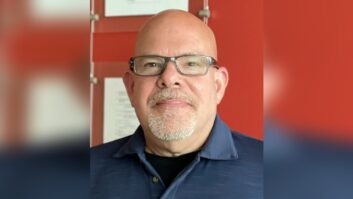It wasn’t that long ago when teenagers who dreamed of being a radio DJ would wait hours in line for a few minutes with a local program director at their high school’s career fair. Recently, though, a PD told me she spent two hours at a career day and talked to just two students.

Cumulus VP/Programming Operations John Dimick, left, at the fall Radio Show with Hubbard Radio President/COO Drew Horowitz, Radio Advertising Bureau President/CEO Erica Farber, Neuhoff Communications COO Michael Hulvey and, far right, former Univision Radio President Jose Valle.
Another radio leader, Lynn Barstow, programs a station that’s popular among younger people in a hip college city — KROX in Austin — so you might think he’d have lots of applicants. Nope.
“Honestly, it doesn’t feel like anyone is trying anymore,” he says. “I can count the résumés I received last year on maybe two hands and a foot.”
The bad news is that good jobs in radio are scarce. Barstow hasn’t had turnover in his full-time air staff in a decade.
If you’re looking for a new gig in 2018, here are seven job hunting tips from the experts — the people who do the hiring:
1. Get a foot in the door.
Smart, capable people get noticed. Barstow points to a sharp young woman who got into the building as an unpaid intern and was soon the executive assistant to the general manager.
“She’d done college radio, so she parlayed that into voicing some spots,” says Barstow. “She’s our top swing talent now and has moved into the promotions department.”
2. Call! (But not every day.)
“Once someone [who ’s hiring] is aware of you, you’ve done enough,” says Cumulus Media VP/Programming Operations John Dimick. “It doesn’t hurt to check in while a posting is still up, but trying to close the deal is pushing it a little too much.”
Townsquare Media SVP/Programming Kurt Johnson also welcomes phone calls but says, “Don’t just respond to trade ads. Do your homework. Find an employer you want to work with” and keep in touch.

Townsquare Media SVP/Programming Kurt Johnson
3. Develop a relationship … now.
“By the time we post an opening, I’m already thinking about who might be right for the position,” says Dimick. “People who have already taken the time to reach out and let me know their interest in working with us have an advantage.”
Dimick and Johnson say approaching them at industry events like The Conclave, fall Radio Show and Worldwide Radio Summit is a good way to get acquainted.
“Those are people who are actively working to improve themselves and their careers,” says Johnson.
Then again, he notices talented people lots of places.
“I have hired people from other radio stations, social media, podcasts, YouTube, recent college grads, a funny caller to a morning show, a McDonald’s drive-thru person, a truck driver, a teacher, a policeman, a person sitting next to me on a plane, and someone who dialed a wrong number.”
He’s not kidding.
4. Be social.
As in … social media. If you think prospective employers look at your Facebook, Twitter and Instragram, you’re right. Demonstrate that you can post engaging content and have a fun personality.
Dimick warns, “It’s easy to find out a lot about someone without even talking with them. Be sure your social is on-point and not off the ledge.” Barstow isn’t just looking for your faults. He visits social profiles “to see if they might be hiding a marketable personality under a layer of inexperience and a lack of coaching.”
5. Podcast.
I begin every talk to college broadcasting classes by asking, “Who wants to host their own show?” A few hands go up. “Then why aren’t you?” Every beginning broadcaster who needs a stage now has one, because there’s almost no barrier of entry for podcasting. When hiring, Dimick still likes to hear “a good tight aircheck,” but “podcasting and YouTube are great places to practice your craft.”

KROX Austin Program Director Lynn Barstow
6. Make it easy.
Dimick says he often listens to audio and reviews résumés while he’s flying or over the weekend, “so make it quick and easy to find your materials. Attach it to an email or put it in a DropBox.”
Put yourself in the employer’s shoes.
“I once asked a candidate to send me their materials in an email. They told me I could find them using a link in the original package,” says Dimick. Really? “I didn’t bother.”
Believe it or not, someone once sent Barstow a box of 75 unscoped airchecks on cassette. “It was on me to send the tapes back.”
7. Update your skills.
Centuries before radio’s invention, the Greek philosopher Heraclitus said, “The only that is constant is change.” Barstow laments that some applicants are “former radio people trying to get back into the business but don’t realize how much it’s changed.”
What skills are needed nowadays? Johnson says it’s a long list, including “understanding the changing consumer landscape, being conversant in new technology, content platforms and delivery systems. Above all, you need to be smart and resourceful, able to pivot as conditions change.”
A bonus final tip: As anyone who has tried to find a job can tell you, it’s quite a job in itself. If 2018 is the year you want to begin your career or find that elusive “better opportunity,” be persistent, don’t get discouraged and … good luck!
After 9-1/2 years programming L.A.’s “100.3 the Sound” and 12 years consulting Jacobs Media client stations, Dave Beasing is about to break ground on studios for his on-demand audio startup. He can be reached at [email protected].










